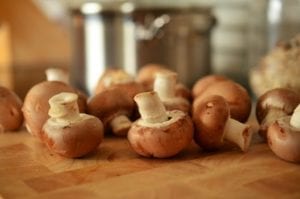Written by Joyce Smith, BS. Mushroom consumption was associated with delayed mild cognitive impairment and may be a potential preventive measure to slow cognitive decline and neurodegeneration in aging populations.
 Only two epidemiological studies have examined the cognitive benefits of mushroom consumption in community-living elderly people 1,2. What is not known is whether mushroom consumption protects against mild cognitive impairment (MCI), which is thought to be a transition phase between age-associated cognitive decline and dementia. Data from a 6-year cross-sectional study 3 (2011 to 2017) of 663 Singaporeans, aged 60 years and older and with MCI was analyzed to determine a potential role of mushrooms in slowing down cognitive decline. Excluded were all participants with a diagnosis of dementia and psychiatric disorders. MCI was assessed using the Singapore modified Mini-Mental State Examination (SM-MMSE).
Only two epidemiological studies have examined the cognitive benefits of mushroom consumption in community-living elderly people 1,2. What is not known is whether mushroom consumption protects against mild cognitive impairment (MCI), which is thought to be a transition phase between age-associated cognitive decline and dementia. Data from a 6-year cross-sectional study 3 (2011 to 2017) of 663 Singaporeans, aged 60 years and older and with MCI was analyzed to determine a potential role of mushrooms in slowing down cognitive decline. Excluded were all participants with a diagnosis of dementia and psychiatric disorders. MCI was assessed using the Singapore modified Mini-Mental State Examination (SM-MMSE).
The study focused on six mushrooms commonly consumed in Singapore: golden, oyster, shitake, white button, and dried and canned mushrooms. A portion size was defined as three quarter cup of cooked mushrooms (approximately 150 grams) and two portions were equivalent to approximately one-half a plate of mushrooms. Data analysis revealed the following:
- Participants with MCI were found to have a higher proportion of hypertension, diabetes, and stroke, were less active in terms of social activities, and had lower Mini-Mental State Examination (MMSE) scores than participants without MCI.
- Participants with MCI also had a lower intake of mushrooms compared to those without MCI (mean [SD], 1.43 [1.44] vs 2.10 [2.25], respectively; P = .001).
- Participants who consumed > 2 portions of mushrooms per week had a reduced odds of having MCI (OR, 0.43; 95% CI, 0.24 – 0.75; P = .003). The association remained even after researchers adjusted for factors such as age, gender, demographic, lifestyle, and medical conditions (OR, 0.43; 95% CI, 0.23 – 0.78; P = .006).
- Further adjustment for BMI, arthritis, cancer, and the consumption of meat, green vegetables, fruits, and nuts did not substantially change the results for those who consumed > 2 portions of mushrooms weekly (adjusted OR, 0.48; 95% CI, 0.26 – 0.89; P = .021).
Compared with participants who consumed mushrooms less than once per week, those who consumed more than two portions per week had an increased potential of delaying mild cognitive impairment. The authors attribute these results to the mushroom-rich bioactive compound ergothioneine 4, a thione-derivative of histamine with unique antioxidant, anti-inflammatory, and cytoprotective properties which humans cannot synthesize on their own, but which the body can readily absorb 5,6. Additional bioactive mushroom compounds, such as hericenones, erinacines, scabronines and dictyophorines may promote the synthesis of nerve growth factors 7 and inhibit the production of amyloid and phosphorylated tau, and acetylcholinesterase 8, thus protecting the brain from neurodegeneration.
Limitations of this study include its cross- sectional design which cannot prove causality. Also, the participants’ self-reported information may not be accurate, particularly for those with mild cognitive impairment. In addition, there may have been residual confounding factors that were overlooked. Therefore, the authors recommend that a follow-up longitudinal study be done, with a larger sample size and using peripheral biomarkers of both ergothioneine and age-related dementia.
Source: Feng, Lei, Irwin Kee-Mun Cheah, Maisie Mei-Xi Ng, Jialiang Li, Sue Mei Chan, Su Lin Lim, Rathi Mahendran, Ee-Heok Kua, and Barry Halliwell. “The Association between Mushroom Consumption and Mild Cognitive Impairment: A Community-Based Cross-Sectional Study in Singapore.” Journal of Alzheimer’s Disease Preprint (2019): 1-7.
© 2019 – IOS Press and the authors. All rights reserved
Click here to read the full text study.
Posted April 8, 2019.
Joyce Smith, BS, is a degreed laboratory technologist. She received her bachelor of arts with a major in Chemistry and a minor in Biology from the University of Saskatchewan and her internship through the University of Saskatchewan College of Medicine and the Royal University Hospital in Saskatoon, Saskatchewan. She currently resides in Bloomingdale, IL.
References:
- Nurk E, Refsum H, Drevon CA, et al. Cognitive performance among the elderly in relation to the intake of plant foods. The Hordaland Health Study. British journal of nutrition. 2010;104(8):1190-1201.
- Zhang S, Tomata Y, Sugiyama K, Sugawara Y, Tsuji I. Mushroom consumption and incident dementia in elderly Japanese: The Ohsaki Cohort 2006 Study. Journal of the American Geriatrics Society. 2017;65(7):1462-1469.
- Feng L, Cheah IK-M, Ng MM-X, et al. The Association between Mushroom Consumption and Mild Cognitive Impairment: A Community-Based Cross-Sectional Study in Singapore. Journal of Alzheimer’s Disease. 2019(Preprint):1-7.
- Weigand-Heller AJ, Kris-Etherton PM, Beelman RB. The bioavailability of ergothioneine from mushrooms (Agaricus bisporus) and the acute effects on antioxidant capacity and biomarkers of inflammation. Preventive medicine. 2012;54:S75-S78.
- Tschirka J, Kreisor M, Betz J, Gründemann D. Substrate selectivity check of the ergothioneine transporter. Drug Metabolism and Disposition. 2018;46(6):779-785.
- Cheah IK, Tang RM, Yew TS, Lim KH, Halliwell B. Administration of pure ergothioneine to healthy human subjects: Uptake, metabolism, and effects on biomarkers of oxidative damage and inflammation. Antioxidants & redox signaling. 2017;26(5):193-206.
- Mori K, Inatomi S, Ouchi K, Azumi Y, Tuchida T. Improving effects of the mushroom Yamabushitake (Hericium erinaceus) on mild cognitive impairment: a double‐blind placebo‐controlled clinical trial. Phytotherapy Research: An International Journal Devoted to Pharmacological and Toxicological Evaluation of Natural Product Derivatives. 2009;23(3):367-372.
- Phan C-W, David P, Naidu M, Wong K-H, Sabaratnam V. Therapeutic potential of culinary-medicinal mushrooms for the management of neurodegenerative diseases: diversity, metabolite, and mechanism. Critical Reviews in Biotechnology. 2015;35(3):355-368.
